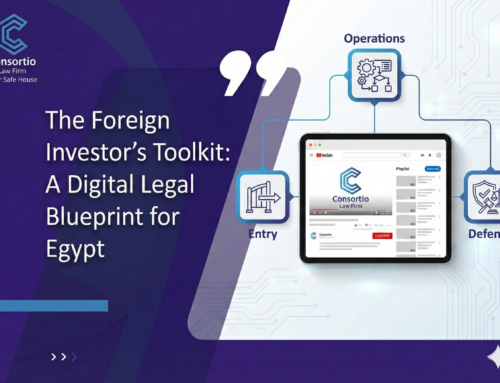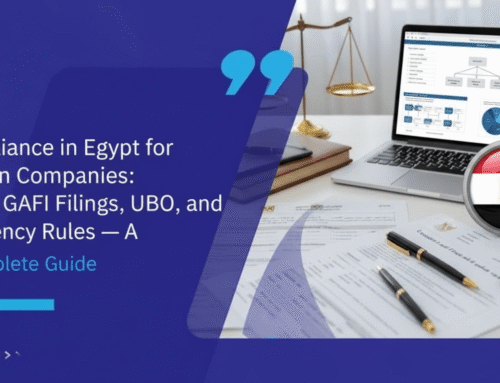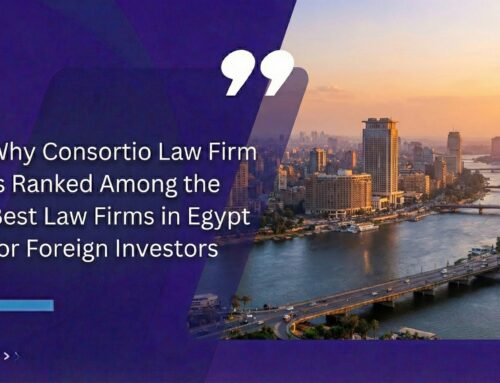Every thriving business starts with a strong legal foundation, and in Egypt, that foundation begins with understanding the Formation of Company in Company Law. Whether you’re a first-time founder or an international investor looking to tap into a fast-growing market, Egypt offers vast opportunities backed by clear legal pathways. But success doesn’t happen by chance, it’s built through informed choices, strategic planning, and the right legal steps.
This article is your roadmap to launching your company the right way, turning vision into value in the heart of North Africa.
What Is Company Formation in Company Law in Egypt?
Company formation is the legal Incorporation of a business entity. Once registered, the company is considered a juridical person separate from its founders or shareholders, capable of owning assets, entering into contracts and bearing liabilities.
In Egypt, company formation refers to the legal process of creating and registering a company so that it is recognized as a legal entity under Egyptian laws.
This process is governed primarily by:
- The Companies Law No. 159 of 1981.
- Investment Law No. 72 of 2017.
- Commercial Code No. 17 of 1999.
- And relevant executive regulations.
Once the company registered:
- The company becomes a separate legal person.
- Shareholders/partners have liability based on the type of company.
- The company can operate legally, own property, sue and be sued.
Types of Companies Under Company Law in Egypt
There are many types of companies with different legal structures that can be established based on the Egyptian Company Law, including:
Limited Liability Company (LLC)
- An LLC is a common company form in Egypt, especially for SMEs and foreign investors.
- A closed structure where the liability of each partner is limited to their shares.
- Requires a minimum of two and a maximum of fifty partners.
- Shares cannot be traded on the stock exchange or freely transferred.
- The company name must include “Limited Liability Company” and may include one or more partner names.
- No minimum capital requirement.
- Managed by one or more managers appointed by the partners; does not require a board of directors.
Joint Stock Company (JSC)
- A Joint Stock Company is a capital-based company ideal for large-scale operations and public investment.
- May be established via:
- Private subscription by founders only (closed company).
- Public subscription offering shares to the general public.
- Requires a minimum capital of EGP 250,000 for closed JSCs, and EGP 500,000 if publicly listed.
- Must have at least three shareholders.
- Managed by a Board of Directors (BOD) elected by shareholders; terms typically last three years (five years for the first board).
- Subject to regulation by the Egyptian Financial Regulatory Authority (FRA) and possibly the Egyptian Exchange, making it more suitable for complex business structures.
One-Person Company (OPC)
- The OPC is designed for single owners who want limited liability.
- Owned by one individual or legal entity only.
- The owner’s liability is limited to the capital of the company.
- Requires a minimum capital of EGP 1,000, fully paid upon Incorporation.
- The name of the company must include “One-Person Company” to reflect its structure.
- Offers a simple management structure, typically managed directly by the owner or a designated manager.
Sole Proprietorship
- A Sole Proprietorship is a business owned and operated by a single individual.
- No legal distinction between the owner and the business.
- The owner has unlimited personal liability for all debts and obligations.
- No minimum capital is legally required.
- Cannot have partners or issue shares.
- Simple to establish and operate, but not suitable for high-risk ventures or attracting investors.
- Commonly used for small-scale, individual businesses and freelancers.
Limited Partnership
- This company form includes both active and passive investors:
- Comprised of:
- General partners with unlimited liability who manage the business.
- Limited partners whose liability is limited to their capital contribution.
- Requires at least one general partner and one limited partner.
- Only general partners are involved in management; limited partners cannot participate in daily operations.
- No legal minimum capital requirement.
- Suitable for joint ventures where silent partners want limited risk.
Foreign Company Branch
- A foreign entity may operate in Egypt through a registered branch.
- The branch conducts commercial activities on behalf of the parent company.
- Must be registered with the Egyptian Commercial Registry and General Authority for Investment (GAFI).
- The foreign parent company is fully liable for the branch’s obligations.
- A legal representative must be appointed in Egypt.
- Annual financial reports must be submitted in accordance with Egyptian regulations.
- Commonly used by multinational companies entering the Egyptian market.
Representative Office
- A Representative Office is used for non-commercial operations.
- Established by a foreign company to conduct market research, feasibility studies or promotional activities.
- Not allowed to engage in commercial or profit-generating activities.
- Must be registered with GAFI, though it is not a separate legal entity.
- Entirely dependent on and funded by the parent company.
- Often used as a preliminary step before full commercial entry into Egypt.
Key Stages in the Formation of a Company in Egypt
Company formation in Egypt involves several legal and administrative steps to officially establish a business entity. The process is overseen by the General Authority for Investment and Free Zones (GAFI) and varies slightly depending on the company type.
Below are the key stages:
-
Choose the Legal Form
Decide the type of company (e.g., LLC, JSC, OPC) based on your business needs, capital, number of owners and liability preference.
-
Reserve the Company Name
Submit a name reservation request at the General Authority for Investment and Free Zones (GAFI) to ensure the company name is unique and legally acceptable.
-
Prepare Legal Documents
Gather and draft required documents, including:
- Articles of Incorporation.
- IDs or passports of founders.
- Power of attorney (if needed).
- Lease contract for business premises.
- Bank certificate (for capital deposit, if required).
-
Submit the Incorporation Application
File the Incorporation documents with GAFI, including the application form, legal documents and payment of fees.
-
Review and Approval by GAFI
GAFI reviews the application and, if approved, issues a preliminary approval and proceeds with company registration.
-
Obtain Commercial Registration
The company is officially registered in the Commercial Registry, making it a legal entity. A Commercial Registration Number is issued.
-
Obtain Tax Card and VAT Registration
Register with the Egyptian Tax Authority to receive a Tax ID and, if applicable, register for Value Added Tax (VAT).
-
Register with Employment Law (if hiring staff)
If the company will employ workers, register with the Employment Law Authority for employee social security coverage.
-
Open Bank Account
Open a corporate bank account in the company’s name for financial operations and capital deposits.
Need a Legal Support? … “Consortio” is the Best Partner
Every great business begins with a bold decision and the right legal foundation. Whether you’re an ambitious entrepreneur, investor or visionary brand, understanding the Formation of Company in Company Law in Egypt isn’t just a legal formality, it’s your first bold step toward sustainable success in a booming market.
At “Consortio Law Firm”, our expert legal team is here to guide you through every step of your company formation and legal needs in Egypt.
Our top lawyers in Egypt assist with:
- Choosing the best legal structure for your business.
- Drafting and reviewing all legal documents, including Articles of Incorporation and contracts.
- Handling registration with GAFI, the Commercial Registry and the Tax Authority.
- Ensuring full legal compliance with Egyptian Company Law.
- Advising on tax, labor and regulatory issues.
- Protecting your interests in negotiations, partnerships and disputes.
- Handling mergers, acquisitions and company restructuring.
- Advising on corporate governance and shareholder agreements.
- Supporting in cross-border transactions and Foreign Investment s.
- Providing ongoing legal advice as your business evolves.
With “Consortio”, you get expert support that protects your interests and makes your business journey in Egypt easier and faster.
Ready to launch your business in Egypt the right way?
Contact us Today for a comprehensive consultation via:
Phone number: 002-01028806061.
Via: WhatsApp.
Email: Info@consortiolawfirm.com.
FAQ’s
-
What is a company and how is it formed?
A company is a legal entity formed by individuals or groups to conduct business. It is formed by registering with the relevant authorities, drafting a constitution (articles of association) and fulfilling legal requirements.
-
How to form a company in Egypt?
- Choose the legal structure.
- Reserve a company name.
- Prepare the articles of association, deposit capital (if required).
- Submit documents to GAFI.
- Obtain commercial registration and tax card.
-
What are the rules for formation of a new company?
Follow Companies Law No. 159 of 1981, comply with minimum shareholder and capital requirements, draft required documents, register with GAFI and meet sector-specific regulations.
-
What is the most common business structure for foreign investors?
The Limited Liability Company (LLC) is the most common due to its flexible structure and limited liability for shareholders.
-
Can a foreigner own 100% of a company in Egypt?
Yes, foreigners can own 100% of most types of companies, subject to some sector-specific restrictions.
-
Are there any incentives for foreign investors in Egypt?
Yes, under the Investment Law, including tax exemptions, customs duty reductions and land allocation benefits.





